Care Principles: Implementation, Policy Impacts & Good Practices
VerifiedAdded on 2023/06/18
|9
|2864
|132
Essay
AI Summary
This essay provides a detailed overview of the principles of care within healthcare, focusing on their implementation, the impact of policies and regulations, and the significance of care relationships. It explores principles of good practice, anti-discrimination measures, and relevant protection policies. The essay emphasizes the importance of valuing patient uniqueness, upholding responsibilities, and promoting effective communication. It also discusses the role of legislation, regulations, and codes of practice in setting standards for care workers, highlighting key aspects such as the Care Act 2014. Furthermore, it examines the ethics of healthcare, including autonomy, beneficence, justice, veracity, and fidelity, while also addressing the importance of preventing discrimination and abuse to ensure patient wellbeing. The essay underscores the need for structured boundaries in care relationships and the ethical considerations that guide healthcare professionals in providing optimal care.
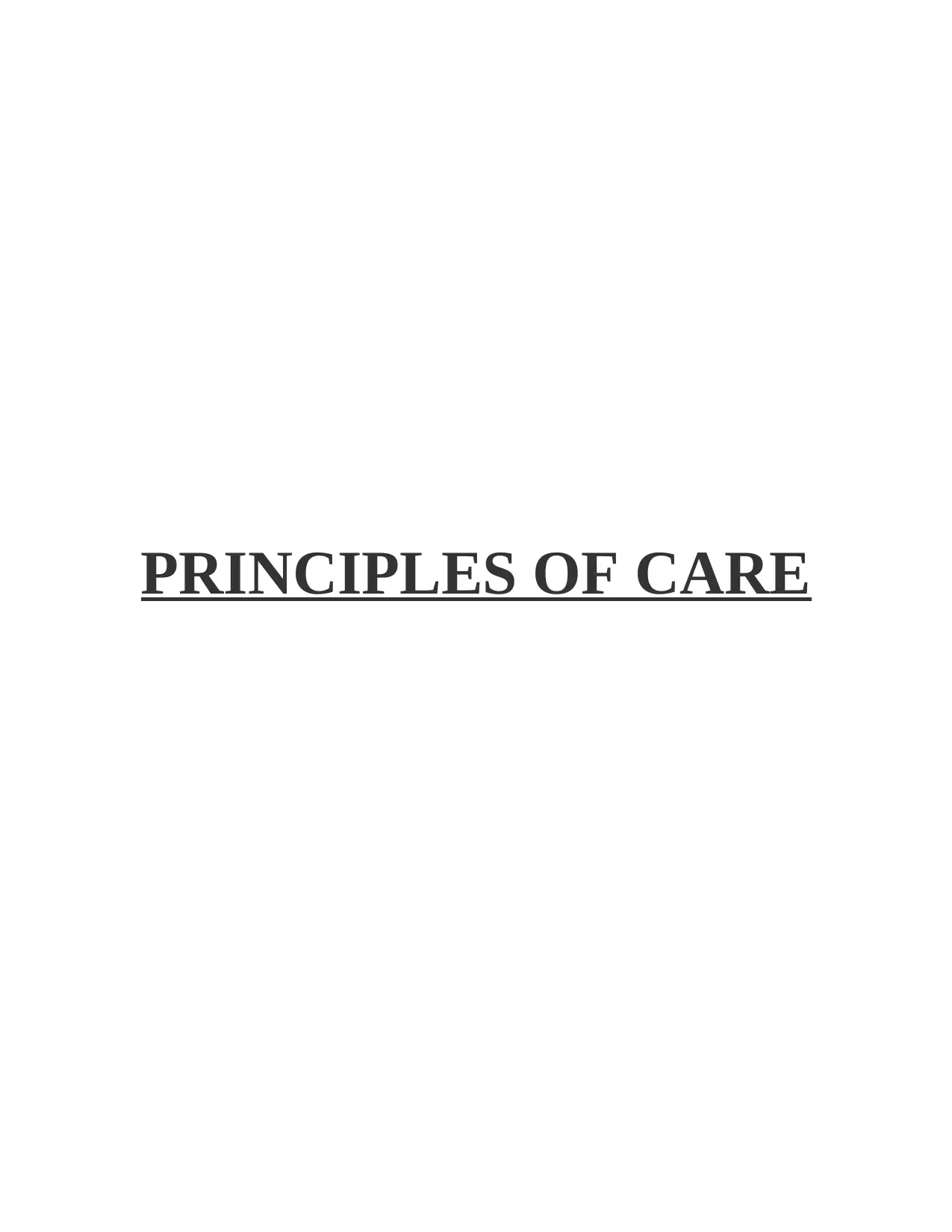
PRINCIPLES OF CARE
Paraphrase This Document
Need a fresh take? Get an instant paraphrase of this document with our AI Paraphraser
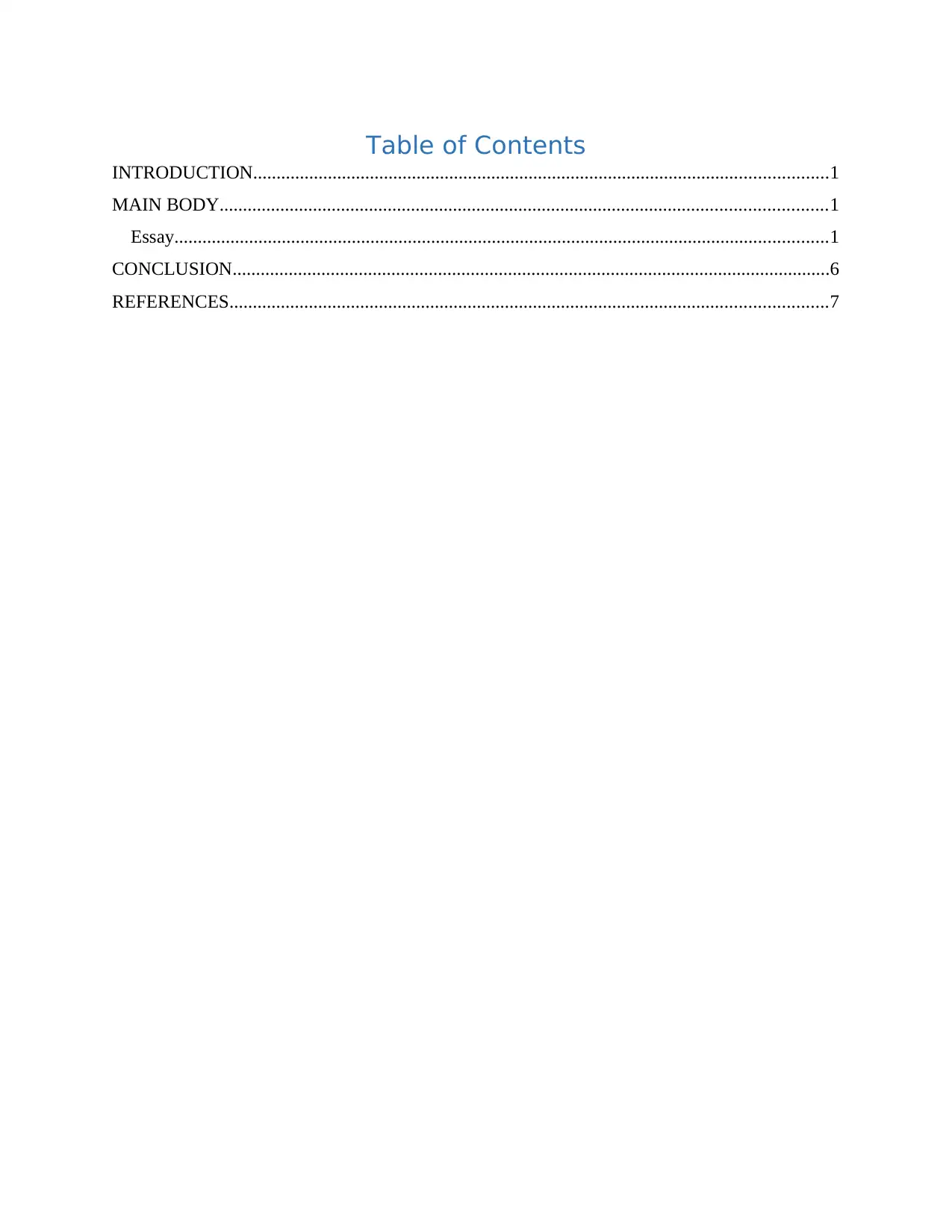
Table of Contents
INTRODUCTION...........................................................................................................................1
MAIN BODY..................................................................................................................................1
Essay............................................................................................................................................1
CONCLUSION................................................................................................................................6
REFERENCES................................................................................................................................7
INTRODUCTION...........................................................................................................................1
MAIN BODY..................................................................................................................................1
Essay............................................................................................................................................1
CONCLUSION................................................................................................................................6
REFERENCES................................................................................................................................7
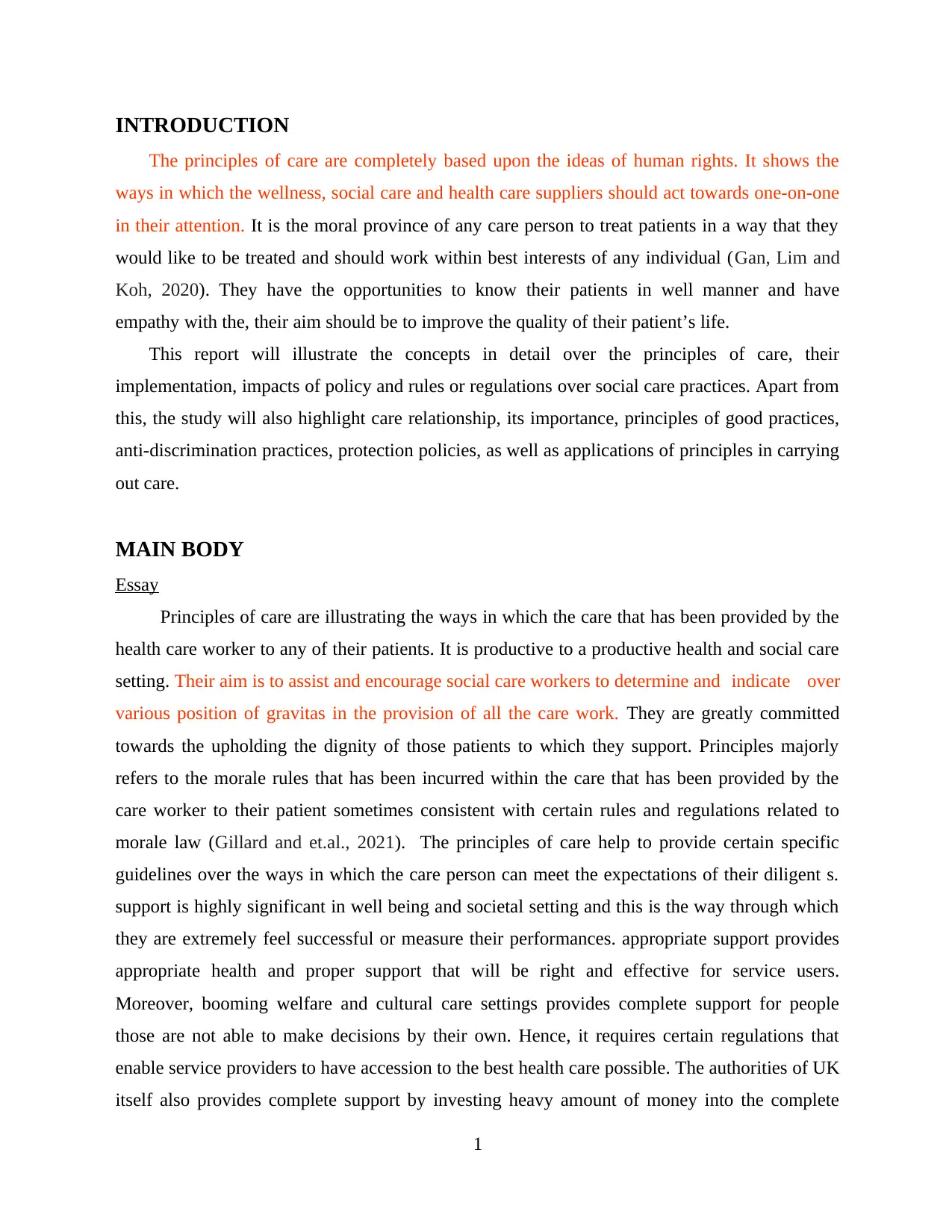
INTRODUCTION
The principles of care are completely based upon the ideas of human rights. It shows the
ways in which the wellness, social care and health care suppliers should act towards one-on-one
in their attention. It is the moral province of any care person to treat patients in a way that they
would like to be treated and should work within best interests of any individual (Gan, Lim and
Koh, 2020). They have the opportunities to know their patients in well manner and have
empathy with the, their aim should be to improve the quality of their patient’s life.
This report will illustrate the concepts in detail over the principles of care, their
implementation, impacts of policy and rules or regulations over social care practices. Apart from
this, the study will also highlight care relationship, its importance, principles of good practices,
anti-discrimination practices, protection policies, as well as applications of principles in carrying
out care.
MAIN BODY
Essay
Principles of care are illustrating the ways in which the care that has been provided by the
health care worker to any of their patients. It is productive to a productive health and social care
setting. Their aim is to assist and encourage social care workers to determine and indicate over
various position of gravitas in the provision of all the care work. They are greatly committed
towards the upholding the dignity of those patients to which they support. Principles majorly
refers to the morale rules that has been incurred within the care that has been provided by the
care worker to their patient sometimes consistent with certain rules and regulations related to
morale law (Gillard and et.al., 2021). The principles of care help to provide certain specific
guidelines over the ways in which the care person can meet the expectations of their diligent s.
support is highly significant in well being and societal setting and this is the way through which
they are extremely feel successful or measure their performances. appropriate support provides
appropriate health and proper support that will be right and effective for service users.
Moreover, booming welfare and cultural care settings provides complete support for people
those are not able to make decisions by their own. Hence, it requires certain regulations that
enable service providers to have accession to the best health care possible. The authorities of UK
itself also provides complete support by investing heavy amount of money into the complete
1
The principles of care are completely based upon the ideas of human rights. It shows the
ways in which the wellness, social care and health care suppliers should act towards one-on-one
in their attention. It is the moral province of any care person to treat patients in a way that they
would like to be treated and should work within best interests of any individual (Gan, Lim and
Koh, 2020). They have the opportunities to know their patients in well manner and have
empathy with the, their aim should be to improve the quality of their patient’s life.
This report will illustrate the concepts in detail over the principles of care, their
implementation, impacts of policy and rules or regulations over social care practices. Apart from
this, the study will also highlight care relationship, its importance, principles of good practices,
anti-discrimination practices, protection policies, as well as applications of principles in carrying
out care.
MAIN BODY
Essay
Principles of care are illustrating the ways in which the care that has been provided by the
health care worker to any of their patients. It is productive to a productive health and social care
setting. Their aim is to assist and encourage social care workers to determine and indicate over
various position of gravitas in the provision of all the care work. They are greatly committed
towards the upholding the dignity of those patients to which they support. Principles majorly
refers to the morale rules that has been incurred within the care that has been provided by the
care worker to their patient sometimes consistent with certain rules and regulations related to
morale law (Gillard and et.al., 2021). The principles of care help to provide certain specific
guidelines over the ways in which the care person can meet the expectations of their diligent s.
support is highly significant in well being and societal setting and this is the way through which
they are extremely feel successful or measure their performances. appropriate support provides
appropriate health and proper support that will be right and effective for service users.
Moreover, booming welfare and cultural care settings provides complete support for people
those are not able to make decisions by their own. Hence, it requires certain regulations that
enable service providers to have accession to the best health care possible. The authorities of UK
itself also provides complete support by investing heavy amount of money into the complete
1
⊘ This is a preview!⊘
Do you want full access?
Subscribe today to unlock all pages.

Trusted by 1+ million students worldwide
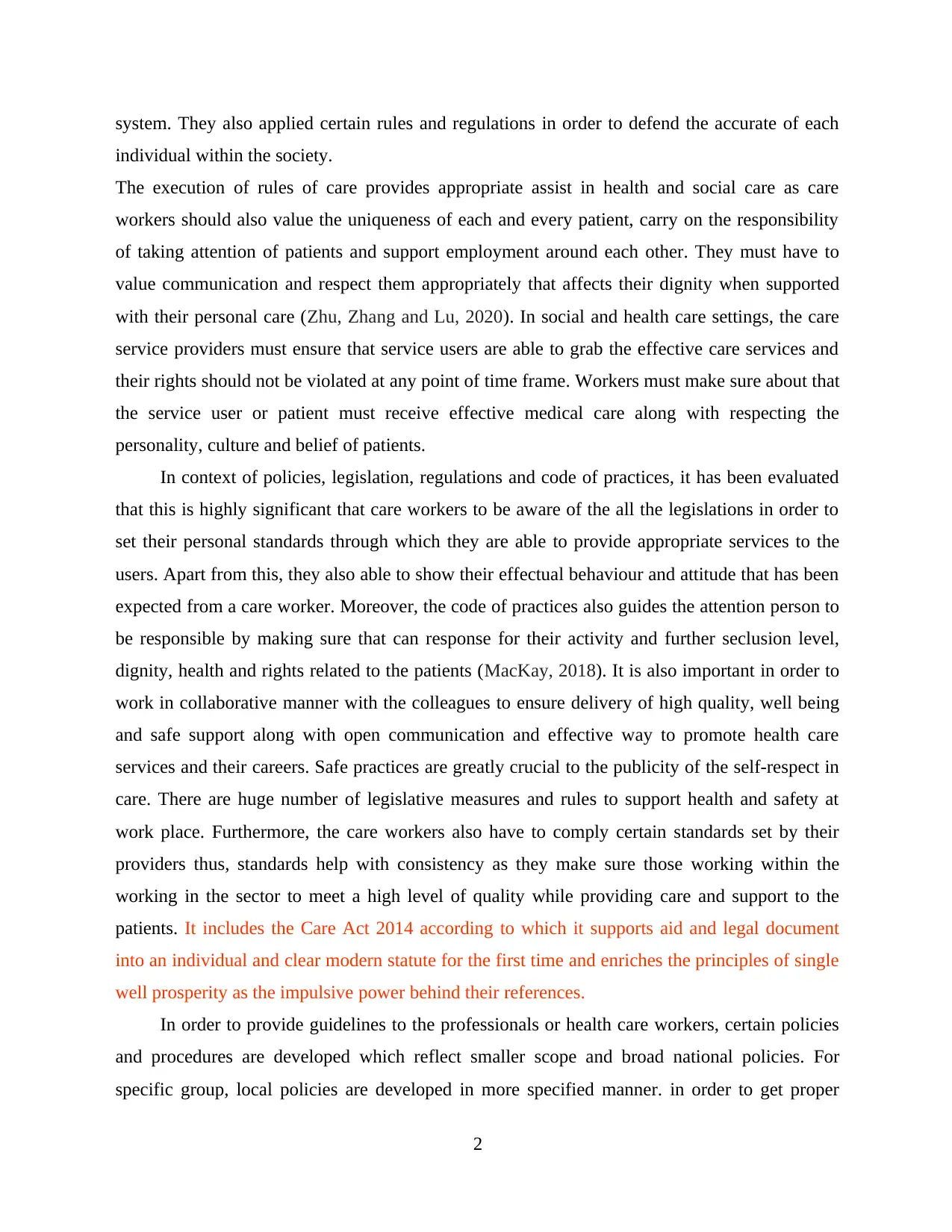
system. They also applied certain rules and regulations in order to defend the accurate of each
individual within the society.
The execution of rules of care provides appropriate assist in health and social care as care
workers should also value the uniqueness of each and every patient, carry on the responsibility
of taking attention of patients and support employment around each other. They must have to
value communication and respect them appropriately that affects their dignity when supported
with their personal care (Zhu, Zhang and Lu, 2020). In social and health care settings, the care
service providers must ensure that service users are able to grab the effective care services and
their rights should not be violated at any point of time frame. Workers must make sure about that
the service user or patient must receive effective medical care along with respecting the
personality, culture and belief of patients.
In context of policies, legislation, regulations and code of practices, it has been evaluated
that this is highly significant that care workers to be aware of the all the legislations in order to
set their personal standards through which they are able to provide appropriate services to the
users. Apart from this, they also able to show their effectual behaviour and attitude that has been
expected from a care worker. Moreover, the code of practices also guides the attention person to
be responsible by making sure that can response for their activity and further seclusion level,
dignity, health and rights related to the patients (MacKay, 2018). It is also important in order to
work in collaborative manner with the colleagues to ensure delivery of high quality, well being
and safe support along with open communication and effective way to promote health care
services and their careers. Safe practices are greatly crucial to the publicity of the self-respect in
care. There are huge number of legislative measures and rules to support health and safety at
work place. Furthermore, the care workers also have to comply certain standards set by their
providers thus, standards help with consistency as they make sure those working within the
working in the sector to meet a high level of quality while providing care and support to the
patients. It includes the Care Act 2014 according to which it supports aid and legal document
into an individual and clear modern statute for the first time and enriches the principles of single
well prosperity as the impulsive power behind their references.
In order to provide guidelines to the professionals or health care workers, certain policies
and procedures are developed which reflect smaller scope and broad national policies. For
specific group, local policies are developed in more specified manner. in order to get proper
2
individual within the society.
The execution of rules of care provides appropriate assist in health and social care as care
workers should also value the uniqueness of each and every patient, carry on the responsibility
of taking attention of patients and support employment around each other. They must have to
value communication and respect them appropriately that affects their dignity when supported
with their personal care (Zhu, Zhang and Lu, 2020). In social and health care settings, the care
service providers must ensure that service users are able to grab the effective care services and
their rights should not be violated at any point of time frame. Workers must make sure about that
the service user or patient must receive effective medical care along with respecting the
personality, culture and belief of patients.
In context of policies, legislation, regulations and code of practices, it has been evaluated
that this is highly significant that care workers to be aware of the all the legislations in order to
set their personal standards through which they are able to provide appropriate services to the
users. Apart from this, they also able to show their effectual behaviour and attitude that has been
expected from a care worker. Moreover, the code of practices also guides the attention person to
be responsible by making sure that can response for their activity and further seclusion level,
dignity, health and rights related to the patients (MacKay, 2018). It is also important in order to
work in collaborative manner with the colleagues to ensure delivery of high quality, well being
and safe support along with open communication and effective way to promote health care
services and their careers. Safe practices are greatly crucial to the publicity of the self-respect in
care. There are huge number of legislative measures and rules to support health and safety at
work place. Furthermore, the care workers also have to comply certain standards set by their
providers thus, standards help with consistency as they make sure those working within the
working in the sector to meet a high level of quality while providing care and support to the
patients. It includes the Care Act 2014 according to which it supports aid and legal document
into an individual and clear modern statute for the first time and enriches the principles of single
well prosperity as the impulsive power behind their references.
In order to provide guidelines to the professionals or health care workers, certain policies
and procedures are developed which reflect smaller scope and broad national policies. For
specific group, local policies are developed in more specified manner. in order to get proper
2
Paraphrase This Document
Need a fresh take? Get an instant paraphrase of this document with our AI Paraphraser
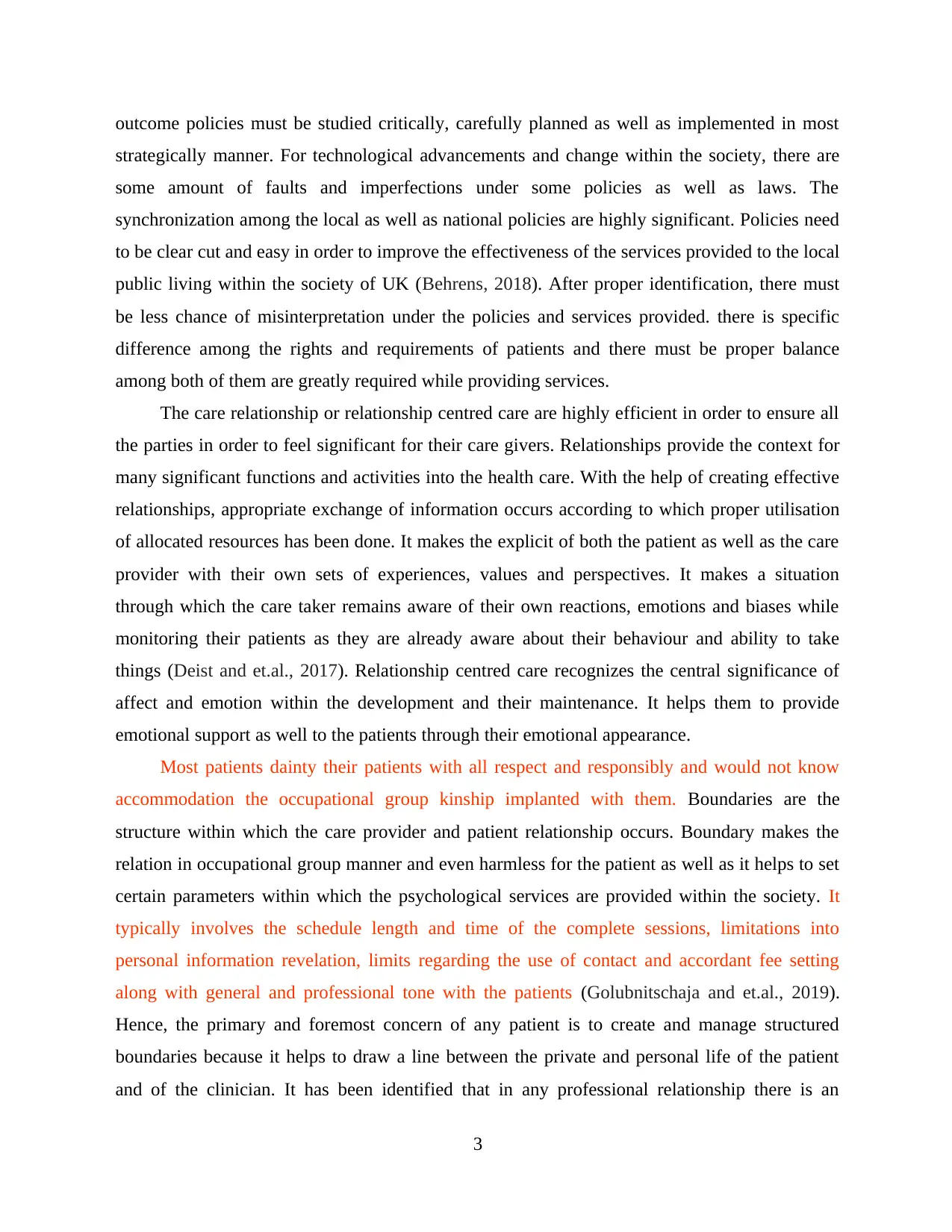
outcome policies must be studied critically, carefully planned as well as implemented in most
strategically manner. For technological advancements and change within the society, there are
some amount of faults and imperfections under some policies as well as laws. The
synchronization among the local as well as national policies are highly significant. Policies need
to be clear cut and easy in order to improve the effectiveness of the services provided to the local
public living within the society of UK (Behrens, 2018). After proper identification, there must
be less chance of misinterpretation under the policies and services provided. there is specific
difference among the rights and requirements of patients and there must be proper balance
among both of them are greatly required while providing services.
The care relationship or relationship centred care are highly efficient in order to ensure all
the parties in order to feel significant for their care givers. Relationships provide the context for
many significant functions and activities into the health care. With the help of creating effective
relationships, appropriate exchange of information occurs according to which proper utilisation
of allocated resources has been done. It makes the explicit of both the patient as well as the care
provider with their own sets of experiences, values and perspectives. It makes a situation
through which the care taker remains aware of their own reactions, emotions and biases while
monitoring their patients as they are already aware about their behaviour and ability to take
things (Deist and et.al., 2017). Relationship centred care recognizes the central significance of
affect and emotion within the development and their maintenance. It helps them to provide
emotional support as well to the patients through their emotional appearance.
Most patients dainty their patients with all respect and responsibly and would not know
accommodation the occupational group kinship implanted with them. Boundaries are the
structure within which the care provider and patient relationship occurs. Boundary makes the
relation in occupational group manner and even harmless for the patient as well as it helps to set
certain parameters within which the psychological services are provided within the society. It
typically involves the schedule length and time of the complete sessions, limitations into
personal information revelation, limits regarding the use of contact and accordant fee setting
along with general and professional tone with the patients (Golubnitschaja and et.al., 2019).
Hence, the primary and foremost concern of any patient is to create and manage structured
boundaries because it helps to draw a line between the private and personal life of the patient
and of the clinician. It has been identified that in any professional relationship there is an
3
strategically manner. For technological advancements and change within the society, there are
some amount of faults and imperfections under some policies as well as laws. The
synchronization among the local as well as national policies are highly significant. Policies need
to be clear cut and easy in order to improve the effectiveness of the services provided to the local
public living within the society of UK (Behrens, 2018). After proper identification, there must
be less chance of misinterpretation under the policies and services provided. there is specific
difference among the rights and requirements of patients and there must be proper balance
among both of them are greatly required while providing services.
The care relationship or relationship centred care are highly efficient in order to ensure all
the parties in order to feel significant for their care givers. Relationships provide the context for
many significant functions and activities into the health care. With the help of creating effective
relationships, appropriate exchange of information occurs according to which proper utilisation
of allocated resources has been done. It makes the explicit of both the patient as well as the care
provider with their own sets of experiences, values and perspectives. It makes a situation
through which the care taker remains aware of their own reactions, emotions and biases while
monitoring their patients as they are already aware about their behaviour and ability to take
things (Deist and et.al., 2017). Relationship centred care recognizes the central significance of
affect and emotion within the development and their maintenance. It helps them to provide
emotional support as well to the patients through their emotional appearance.
Most patients dainty their patients with all respect and responsibly and would not know
accommodation the occupational group kinship implanted with them. Boundaries are the
structure within which the care provider and patient relationship occurs. Boundary makes the
relation in occupational group manner and even harmless for the patient as well as it helps to set
certain parameters within which the psychological services are provided within the society. It
typically involves the schedule length and time of the complete sessions, limitations into
personal information revelation, limits regarding the use of contact and accordant fee setting
along with general and professional tone with the patients (Golubnitschaja and et.al., 2019).
Hence, the primary and foremost concern of any patient is to create and manage structured
boundaries because it helps to draw a line between the private and personal life of the patient
and of the clinician. It has been identified that in any professional relationship there is an
3
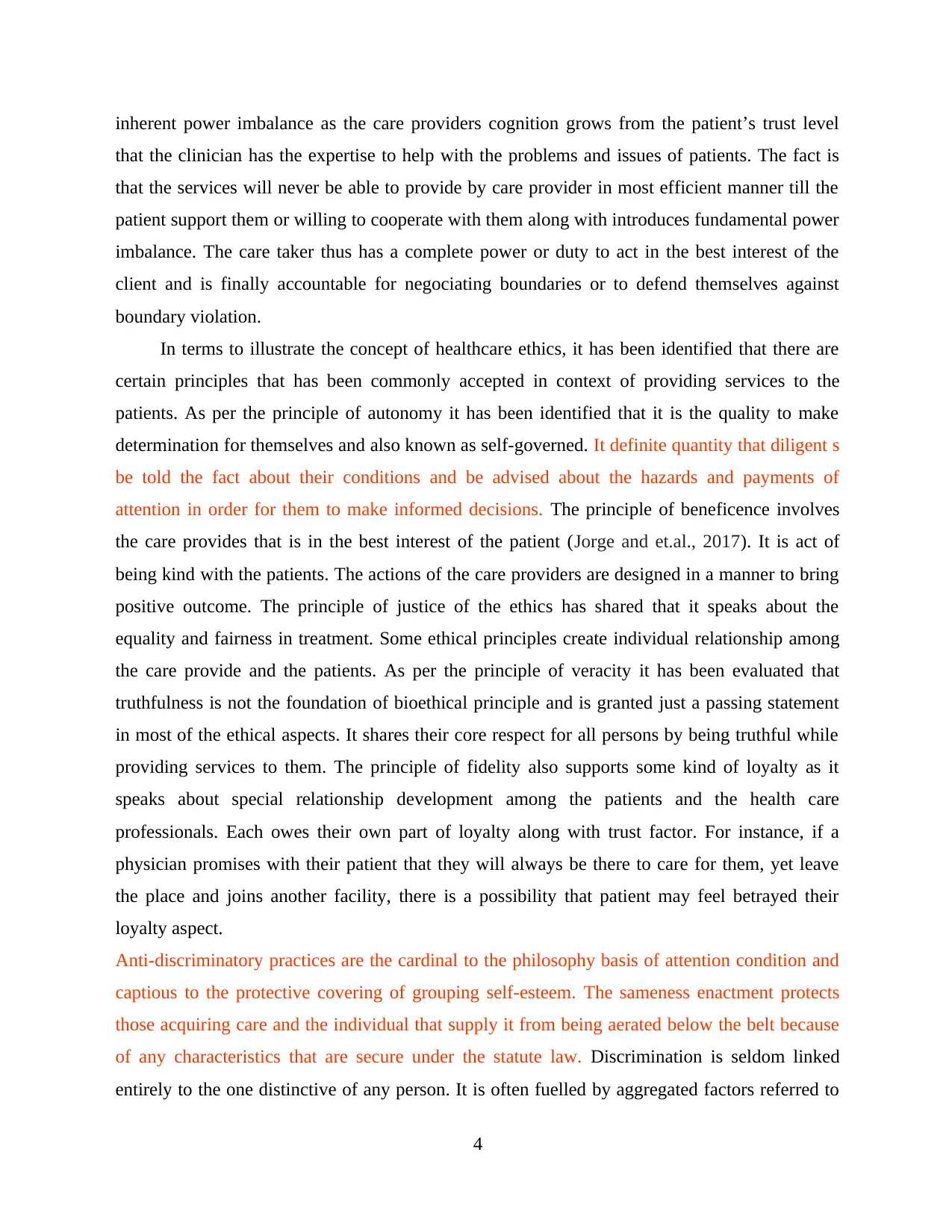
inherent power imbalance as the care providers cognition grows from the patient’s trust level
that the clinician has the expertise to help with the problems and issues of patients. The fact is
that the services will never be able to provide by care provider in most efficient manner till the
patient support them or willing to cooperate with them along with introduces fundamental power
imbalance. The care taker thus has a complete power or duty to act in the best interest of the
client and is finally accountable for negociating boundaries or to defend themselves against
boundary violation.
In terms to illustrate the concept of healthcare ethics, it has been identified that there are
certain principles that has been commonly accepted in context of providing services to the
patients. As per the principle of autonomy it has been identified that it is the quality to make
determination for themselves and also known as self-governed. It definite quantity that diligent s
be told the fact about their conditions and be advised about the hazards and payments of
attention in order for them to make informed decisions. The principle of beneficence involves
the care provides that is in the best interest of the patient (Jorge and et.al., 2017). It is act of
being kind with the patients. The actions of the care providers are designed in a manner to bring
positive outcome. The principle of justice of the ethics has shared that it speaks about the
equality and fairness in treatment. Some ethical principles create individual relationship among
the care provide and the patients. As per the principle of veracity it has been evaluated that
truthfulness is not the foundation of bioethical principle and is granted just a passing statement
in most of the ethical aspects. It shares their core respect for all persons by being truthful while
providing services to them. The principle of fidelity also supports some kind of loyalty as it
speaks about special relationship development among the patients and the health care
professionals. Each owes their own part of loyalty along with trust factor. For instance, if a
physician promises with their patient that they will always be there to care for them, yet leave
the place and joins another facility, there is a possibility that patient may feel betrayed their
loyalty aspect.
Anti-discriminatory practices are the cardinal to the philosophy basis of attention condition and
captious to the protective covering of grouping self-esteem. The sameness enactment protects
those acquiring care and the individual that supply it from being aerated below the belt because
of any characteristics that are secure under the statute law. Discrimination is seldom linked
entirely to the one distinctive of any person. It is often fuelled by aggregated factors referred to
4
that the clinician has the expertise to help with the problems and issues of patients. The fact is
that the services will never be able to provide by care provider in most efficient manner till the
patient support them or willing to cooperate with them along with introduces fundamental power
imbalance. The care taker thus has a complete power or duty to act in the best interest of the
client and is finally accountable for negociating boundaries or to defend themselves against
boundary violation.
In terms to illustrate the concept of healthcare ethics, it has been identified that there are
certain principles that has been commonly accepted in context of providing services to the
patients. As per the principle of autonomy it has been identified that it is the quality to make
determination for themselves and also known as self-governed. It definite quantity that diligent s
be told the fact about their conditions and be advised about the hazards and payments of
attention in order for them to make informed decisions. The principle of beneficence involves
the care provides that is in the best interest of the patient (Jorge and et.al., 2017). It is act of
being kind with the patients. The actions of the care providers are designed in a manner to bring
positive outcome. The principle of justice of the ethics has shared that it speaks about the
equality and fairness in treatment. Some ethical principles create individual relationship among
the care provide and the patients. As per the principle of veracity it has been evaluated that
truthfulness is not the foundation of bioethical principle and is granted just a passing statement
in most of the ethical aspects. It shares their core respect for all persons by being truthful while
providing services to them. The principle of fidelity also supports some kind of loyalty as it
speaks about special relationship development among the patients and the health care
professionals. Each owes their own part of loyalty along with trust factor. For instance, if a
physician promises with their patient that they will always be there to care for them, yet leave
the place and joins another facility, there is a possibility that patient may feel betrayed their
loyalty aspect.
Anti-discriminatory practices are the cardinal to the philosophy basis of attention condition and
captious to the protective covering of grouping self-esteem. The sameness enactment protects
those acquiring care and the individual that supply it from being aerated below the belt because
of any characteristics that are secure under the statute law. Discrimination is seldom linked
entirely to the one distinctive of any person. It is often fuelled by aggregated factors referred to
4
⊘ This is a preview!⊘
Do you want full access?
Subscribe today to unlock all pages.

Trusted by 1+ million students worldwide
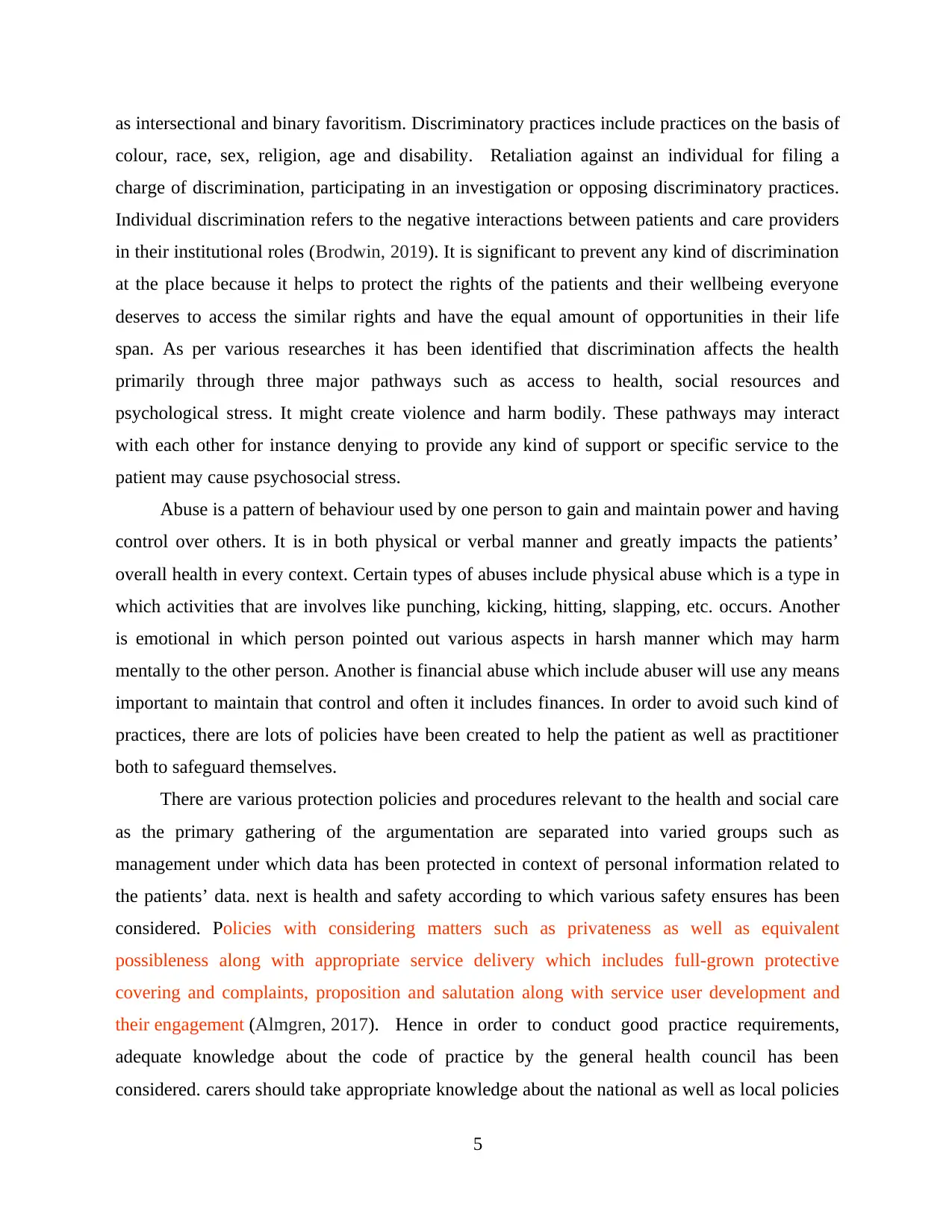
as intersectional and binary favoritism. Discriminatory practices include practices on the basis of
colour, race, sex, religion, age and disability. Retaliation against an individual for filing a
charge of discrimination, participating in an investigation or opposing discriminatory practices.
Individual discrimination refers to the negative interactions between patients and care providers
in their institutional roles (Brodwin, 2019). It is significant to prevent any kind of discrimination
at the place because it helps to protect the rights of the patients and their wellbeing everyone
deserves to access the similar rights and have the equal amount of opportunities in their life
span. As per various researches it has been identified that discrimination affects the health
primarily through three major pathways such as access to health, social resources and
psychological stress. It might create violence and harm bodily. These pathways may interact
with each other for instance denying to provide any kind of support or specific service to the
patient may cause psychosocial stress.
Abuse is a pattern of behaviour used by one person to gain and maintain power and having
control over others. It is in both physical or verbal manner and greatly impacts the patients’
overall health in every context. Certain types of abuses include physical abuse which is a type in
which activities that are involves like punching, kicking, hitting, slapping, etc. occurs. Another
is emotional in which person pointed out various aspects in harsh manner which may harm
mentally to the other person. Another is financial abuse which include abuser will use any means
important to maintain that control and often it includes finances. In order to avoid such kind of
practices, there are lots of policies have been created to help the patient as well as practitioner
both to safeguard themselves.
There are various protection policies and procedures relevant to the health and social care
as the primary gathering of the argumentation are separated into varied groups such as
management under which data has been protected in context of personal information related to
the patients’ data. next is health and safety according to which various safety ensures has been
considered. Policies with considering matters such as privateness as well as equivalent
possibleness along with appropriate service delivery which includes full-grown protective
covering and complaints, proposition and salutation along with service user development and
their engagement (Almgren, 2017). Hence in order to conduct good practice requirements,
adequate knowledge about the code of practice by the general health council has been
considered. carers should take appropriate knowledge about the national as well as local policies
5
colour, race, sex, religion, age and disability. Retaliation against an individual for filing a
charge of discrimination, participating in an investigation or opposing discriminatory practices.
Individual discrimination refers to the negative interactions between patients and care providers
in their institutional roles (Brodwin, 2019). It is significant to prevent any kind of discrimination
at the place because it helps to protect the rights of the patients and their wellbeing everyone
deserves to access the similar rights and have the equal amount of opportunities in their life
span. As per various researches it has been identified that discrimination affects the health
primarily through three major pathways such as access to health, social resources and
psychological stress. It might create violence and harm bodily. These pathways may interact
with each other for instance denying to provide any kind of support or specific service to the
patient may cause psychosocial stress.
Abuse is a pattern of behaviour used by one person to gain and maintain power and having
control over others. It is in both physical or verbal manner and greatly impacts the patients’
overall health in every context. Certain types of abuses include physical abuse which is a type in
which activities that are involves like punching, kicking, hitting, slapping, etc. occurs. Another
is emotional in which person pointed out various aspects in harsh manner which may harm
mentally to the other person. Another is financial abuse which include abuser will use any means
important to maintain that control and often it includes finances. In order to avoid such kind of
practices, there are lots of policies have been created to help the patient as well as practitioner
both to safeguard themselves.
There are various protection policies and procedures relevant to the health and social care
as the primary gathering of the argumentation are separated into varied groups such as
management under which data has been protected in context of personal information related to
the patients’ data. next is health and safety according to which various safety ensures has been
considered. Policies with considering matters such as privateness as well as equivalent
possibleness along with appropriate service delivery which includes full-grown protective
covering and complaints, proposition and salutation along with service user development and
their engagement (Almgren, 2017). Hence in order to conduct good practice requirements,
adequate knowledge about the code of practice by the general health council has been
considered. carers should take appropriate knowledge about the national as well as local policies
5
Paraphrase This Document
Need a fresh take? Get an instant paraphrase of this document with our AI Paraphraser
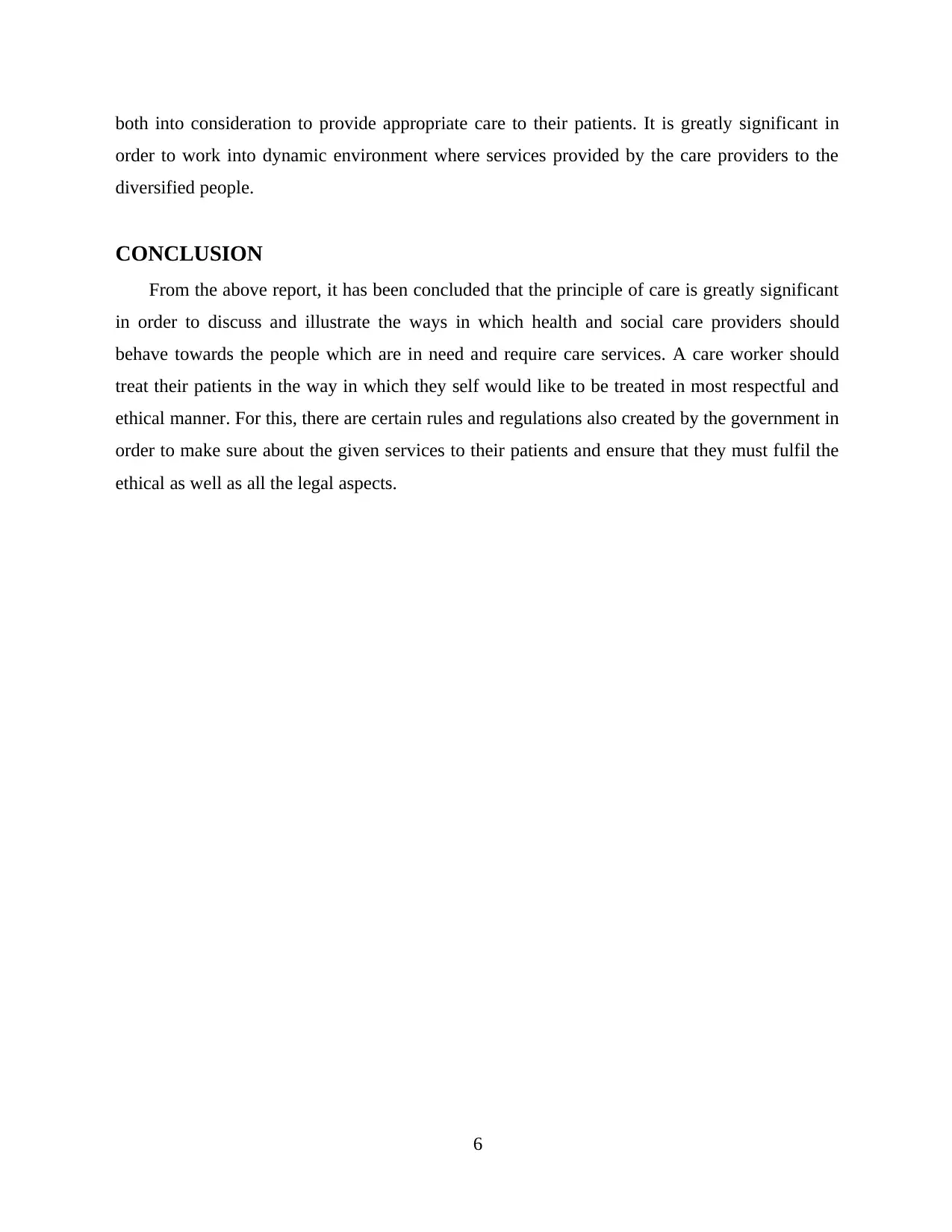
both into consideration to provide appropriate care to their patients. It is greatly significant in
order to work into dynamic environment where services provided by the care providers to the
diversified people.
CONCLUSION
From the above report, it has been concluded that the principle of care is greatly significant
in order to discuss and illustrate the ways in which health and social care providers should
behave towards the people which are in need and require care services. A care worker should
treat their patients in the way in which they self would like to be treated in most respectful and
ethical manner. For this, there are certain rules and regulations also created by the government in
order to make sure about the given services to their patients and ensure that they must fulfil the
ethical as well as all the legal aspects.
6
order to work into dynamic environment where services provided by the care providers to the
diversified people.
CONCLUSION
From the above report, it has been concluded that the principle of care is greatly significant
in order to discuss and illustrate the ways in which health and social care providers should
behave towards the people which are in need and require care services. A care worker should
treat their patients in the way in which they self would like to be treated in most respectful and
ethical manner. For this, there are certain rules and regulations also created by the government in
order to make sure about the given services to their patients and ensure that they must fulfil the
ethical as well as all the legal aspects.
6
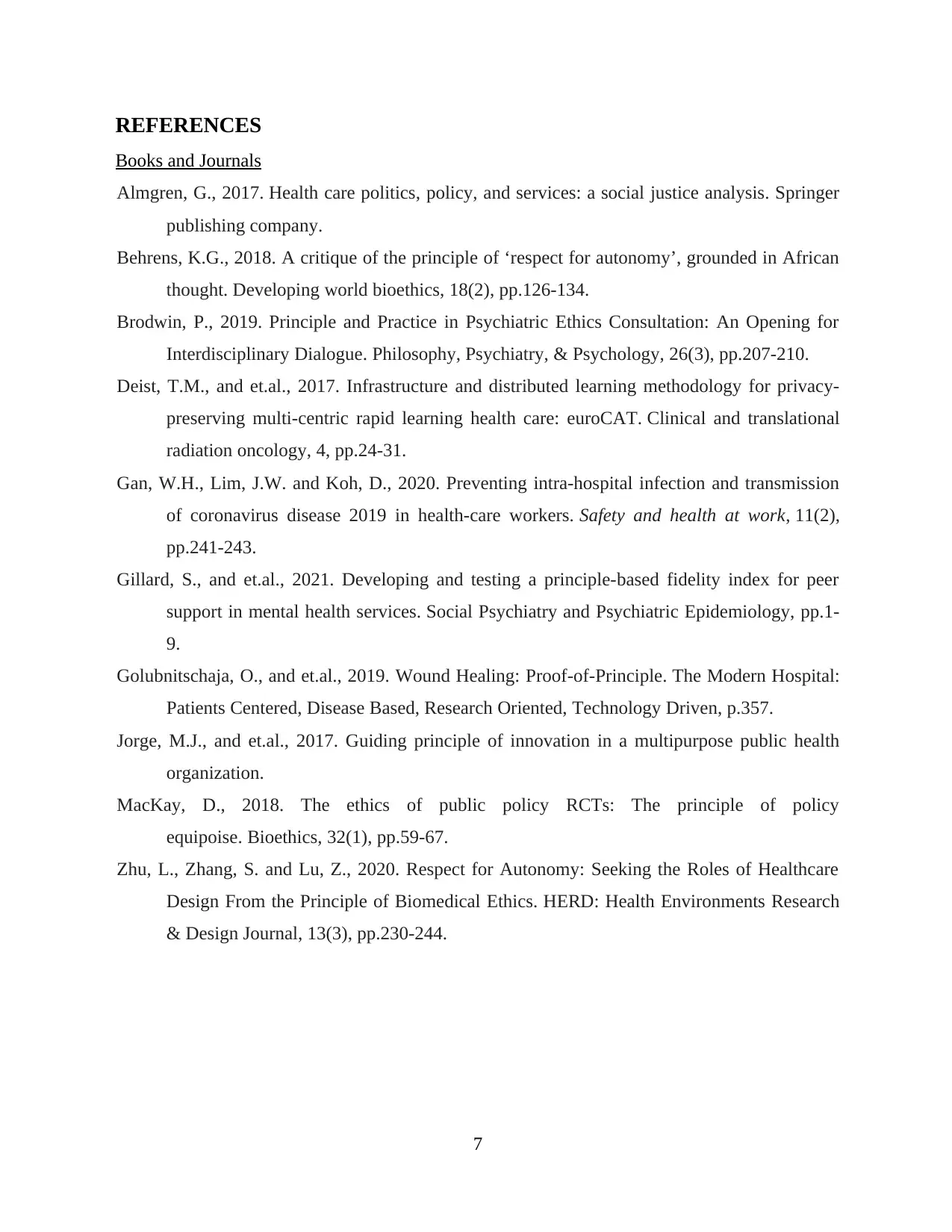
REFERENCES
Books and Journals
Almgren, G., 2017. Health care politics, policy, and services: a social justice analysis. Springer
publishing company.
Behrens, K.G., 2018. A critique of the principle of ‘respect for autonomy’, grounded in African
thought. Developing world bioethics, 18(2), pp.126-134.
Brodwin, P., 2019. Principle and Practice in Psychiatric Ethics Consultation: An Opening for
Interdisciplinary Dialogue. Philosophy, Psychiatry, & Psychology, 26(3), pp.207-210.
Deist, T.M., and et.al., 2017. Infrastructure and distributed learning methodology for privacy-
preserving multi-centric rapid learning health care: euroCAT. Clinical and translational
radiation oncology, 4, pp.24-31.
Gan, W.H., Lim, J.W. and Koh, D., 2020. Preventing intra-hospital infection and transmission
of coronavirus disease 2019 in health-care workers. Safety and health at work, 11(2),
pp.241-243.
Gillard, S., and et.al., 2021. Developing and testing a principle-based fidelity index for peer
support in mental health services. Social Psychiatry and Psychiatric Epidemiology, pp.1-
9.
Golubnitschaja, O., and et.al., 2019. Wound Healing: Proof-of-Principle. The Modern Hospital:
Patients Centered, Disease Based, Research Oriented, Technology Driven, p.357.
Jorge, M.J., and et.al., 2017. Guiding principle of innovation in a multipurpose public health
organization.
MacKay, D., 2018. The ethics of public policy RCTs: The principle of policy
equipoise. Bioethics, 32(1), pp.59-67.
Zhu, L., Zhang, S. and Lu, Z., 2020. Respect for Autonomy: Seeking the Roles of Healthcare
Design From the Principle of Biomedical Ethics. HERD: Health Environments Research
& Design Journal, 13(3), pp.230-244.
7
Books and Journals
Almgren, G., 2017. Health care politics, policy, and services: a social justice analysis. Springer
publishing company.
Behrens, K.G., 2018. A critique of the principle of ‘respect for autonomy’, grounded in African
thought. Developing world bioethics, 18(2), pp.126-134.
Brodwin, P., 2019. Principle and Practice in Psychiatric Ethics Consultation: An Opening for
Interdisciplinary Dialogue. Philosophy, Psychiatry, & Psychology, 26(3), pp.207-210.
Deist, T.M., and et.al., 2017. Infrastructure and distributed learning methodology for privacy-
preserving multi-centric rapid learning health care: euroCAT. Clinical and translational
radiation oncology, 4, pp.24-31.
Gan, W.H., Lim, J.W. and Koh, D., 2020. Preventing intra-hospital infection and transmission
of coronavirus disease 2019 in health-care workers. Safety and health at work, 11(2),
pp.241-243.
Gillard, S., and et.al., 2021. Developing and testing a principle-based fidelity index for peer
support in mental health services. Social Psychiatry and Psychiatric Epidemiology, pp.1-
9.
Golubnitschaja, O., and et.al., 2019. Wound Healing: Proof-of-Principle. The Modern Hospital:
Patients Centered, Disease Based, Research Oriented, Technology Driven, p.357.
Jorge, M.J., and et.al., 2017. Guiding principle of innovation in a multipurpose public health
organization.
MacKay, D., 2018. The ethics of public policy RCTs: The principle of policy
equipoise. Bioethics, 32(1), pp.59-67.
Zhu, L., Zhang, S. and Lu, Z., 2020. Respect for Autonomy: Seeking the Roles of Healthcare
Design From the Principle of Biomedical Ethics. HERD: Health Environments Research
& Design Journal, 13(3), pp.230-244.
7
⊘ This is a preview!⊘
Do you want full access?
Subscribe today to unlock all pages.

Trusted by 1+ million students worldwide
1 out of 9
Related Documents
Your All-in-One AI-Powered Toolkit for Academic Success.
+13062052269
info@desklib.com
Available 24*7 on WhatsApp / Email
![[object Object]](/_next/static/media/star-bottom.7253800d.svg)
Unlock your academic potential
© 2024 | Zucol Services PVT LTD | All rights reserved.




